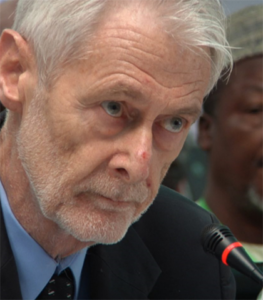Breaking the cycles of conflict, poverty and migration
The West needs to address poverty and conflict in the developing world and reorder its thinking and priorities or the globe will see increases in conflict, terrorism and hazardous irregular migration, according to Irish peacemaker and expert on divided societies Padraig O’Malley.
Writing in the New England Journal of Public Policy, Professor O’Malley says the United Nations is ill-equipped to prevent, much less end, intrastate conflicts.
 “Today’s conflicts and an explosive mix of other interrelated causes—including violence, famine, extreme poverty, climate-related disasters and political oppression—have led to a global migration and population-displacement crisis,” he says.
“Today’s conflicts and an explosive mix of other interrelated causes—including violence, famine, extreme poverty, climate-related disasters and political oppression—have led to a global migration and population-displacement crisis,” he says.
Prof O’Malley warns that global poverty and marginalisation is a prescription for violent conflict and terrorism which, in turn, will drive more irregular and hazardous migration.
He says that military power alone will not defeat terrorism and what is needed is ‘developmental power’ that necessitates a reordering of the West’s thinking and priorities.
“Migration is a global phenomenon. At some moment the rich West will have to direct its attention to the countries at the ladder’s lowest rung. But that won’t happen until crisis becomes catastrophe,” Prof O’Malley says.
“The commitments must be long-term no matter how faltering and difficult partnerships with the countries at barrel’s bottom may be; otherwise they will fail. Marginalization incubates itself.
“Globalization that leaves tens of millions of people in perpetual free fall is a prescription for violent conflicts, out of which will emerge new terrorist groups with agendas of hate and access to the technologies and weapons that will give lethal expression to that hate,” Prof O’Malley says.
He says that unless national security reckonings include the link between poverty and violent conflict and how poverty creates conditions that are breeding grounds for terrorist groups, efforts to quell terrorism will fail
His article references the fact that in sub-Saharan Africa, the epicentre of interstate migration and intrastate conflict, the percentage of people living on less than $1.25 a day in 2015 was more than 41 per cent – 300 million – more than twice as high as any other region on the planet.
“If the West, and more specifically Europe, continues to believe that it can somehow horde enormous wealth without consequence while millions risk their lives to breach its fortified borders, it is inviting disaster,” Prof O’Malley said.
He says that while many of the Millennial Development Goals are being successfully met, numbers migrants and IDPs have increased exponentially in pivotal regions of the world.
He says globalisation and disruptions in economies is creating fragmentation and ultimately conflict.
Prof O’Malley’s article cites research that shows in 1987, 37 wars were taking place in 34 countries; by 2010, that number that declined to 28 wars in 24 countries.
“Then, the total number of conflicts increased from 41 in 2014 to 52 in 2015 and decreased only slightly to 49 in 2016,” Prof O’Malley said.
“By 2017, however, at least fifty-five armed conflicts were wreaking devastation in twenty-nine states and territories.
“Moreover, their intensity has increased disproportionately because of the sophistication of the weaponry involved, the deliberate targeting of civilians as the most efficacious way to achieve military ends, and the resort to atrocity to create pandemonium, inspire terror, and send whole populations fleeing their homesteads.
“Each conflict results in migration,” he said.
Prof O’Malley said smart phones had collapsed distances and become instruments of navigation and information sharing.
“Smart phones are relaying which routes are most desirable, which are to be avoided, where borders are porous and where they are walled off, and which destinations are paths to safety,” he said.
“These innovations in technology have facilitated both conflict and migration,” Prof O’Malley said.












